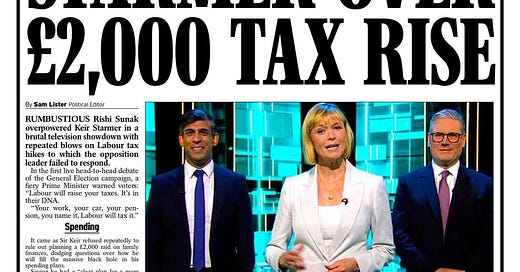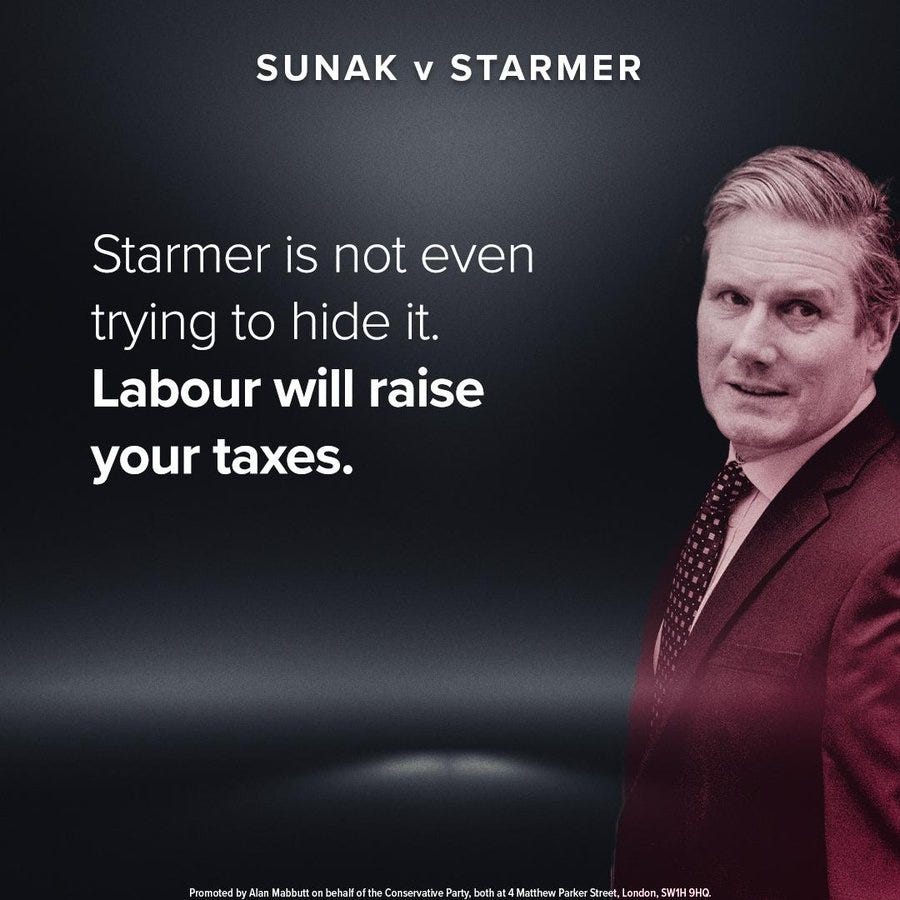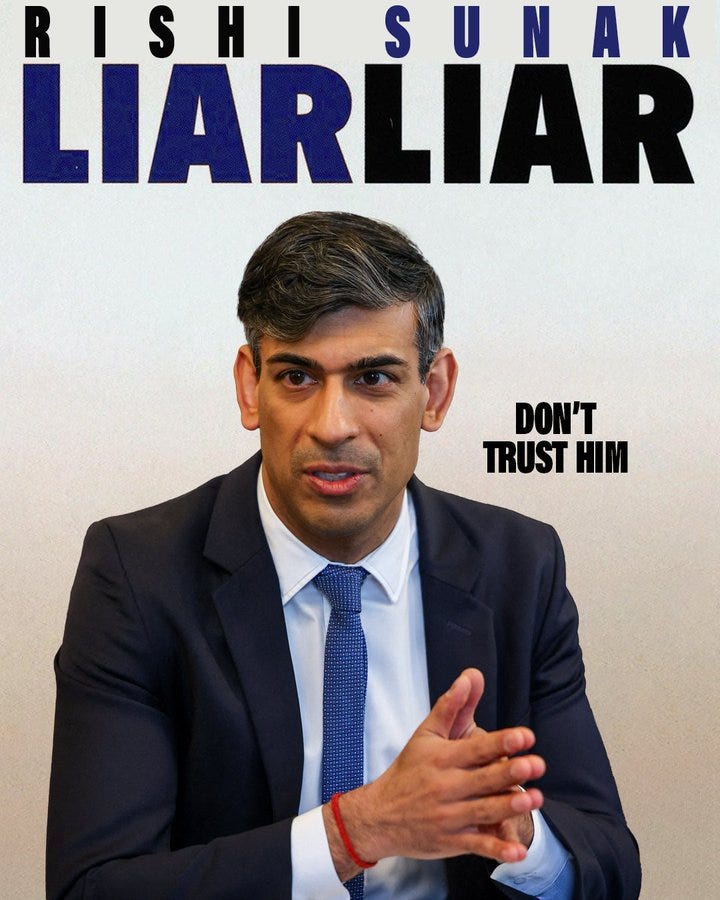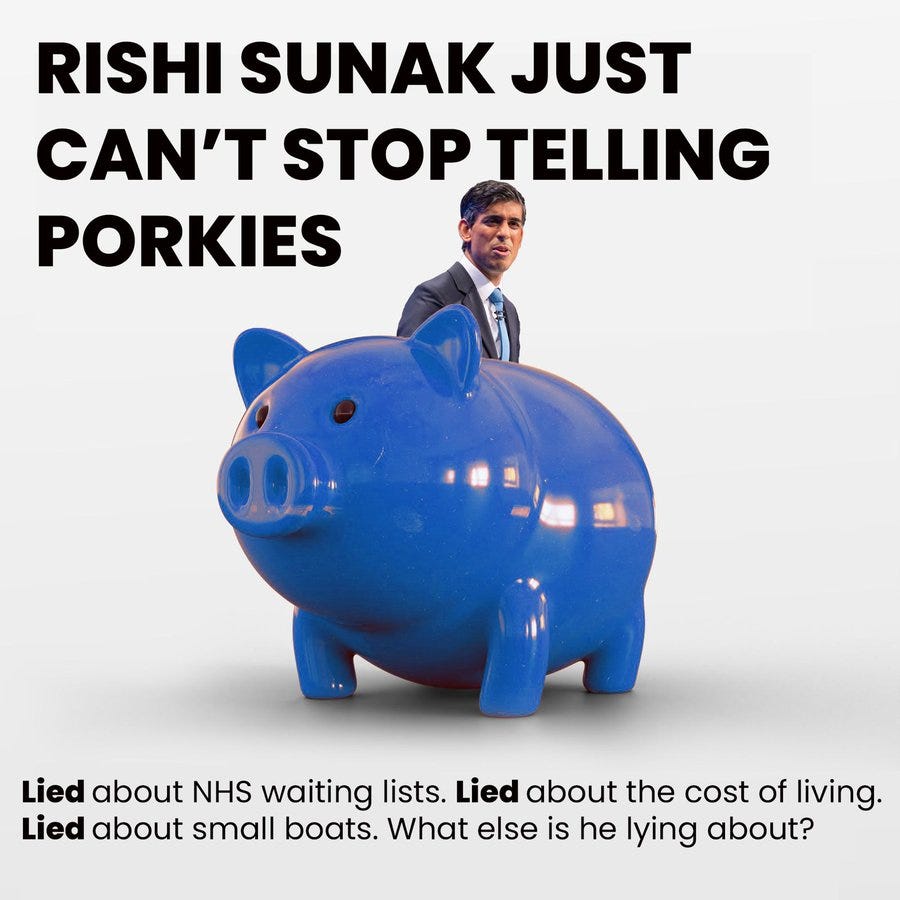Fight!
On the TV debate and its aftermath, and how the Tories managed to turn a row about £2,000 into a row about their own integrity
We’ve got our first proper party-to-party fight of the election campaign. Not the TV debate, although that’s what kicked it off, but the post-debate row over the legitimacy of Rishi Sunak’s claim that Labour’s plans would cost working families £2,000 in extra taxes: that, as he put it, “Independent Treasury officials have costed Labour’s policies and they amount to a £2,000 tax rise for every working family”.
To be clear, the reason this is a post-debate row is that it wasn’t enough of a row in the debate itself. Although Keir Starmer did rebut the claim eventually, calling it “garbage”, he let it hang in the air without challenge for far, far too long. Leaving something unchallenged for a while doesn’t mean it must be right (I mean, obviously, think about how facts work) but it does make it easier to make it stick, and Starmer’s silence meant that it stuck for longer than it should have done - long enough to let the Tories push it hard and for Tory-sympathising newspapers to make it the top line of their post-debate coverage.1
Even during the debate, it was obvious that Starmer’s decision - not one Sunak made - not to barge in and talk over moderator Julie Etchingham to make sure he got his rebuttal out quickly was a tactical mistake, and the Tories quickly made more hay with it than they should have been allowed to. Here are a couple of the many things they tweeted on the night:
And here’s a video posted the morning after the debate from Rishi Sunak’s Twitter account, based on a bad Tory ad I wrote about last week:2
I don’t want to relitigate the substance of the £2,000 claim in detail - I touched on it briefly in a couple of previous posts, here and here - except to say that Starmer is right to describe it as garbage: it involves adding up the cost of policies which are in large part not actually Labour policies,3 based on very questionable assumptions, and then dividing the total number (over a parliament) by the number of working households - a number considerably smaller than the number of households overall. That means that even if you accepted the costings it’s based on, which you shouldn’t because they’re not true, it would still not be true if any of the purported consequent tax rises fell on households without anyone in work, such as pensioner households, or on businesses. And even if you accepted the costings it’s based on, which you shouldn’t because they’re not true, and even if you accepted that the entire cost would fall on working households and not on anyone else, which you shouldn’t because it would be bananas tax policy, the annual figure is not £2,000 but a quarter of that once you divide it by the number of years involved. It is garbage upon garbage upon garbage.
Nevertheless, on this narrow issue, on the night, and notwithstanding the fact that the viewing public saw the debate as somewhere between a tie and a Starmer win,4 the Tories undoubtedly made the running. Labour pushed back hard, but they pushed back harder, at least initially, outside the debate than inside it, as with this tweet from National Campaign Co-ordinator Pat McFadden:
It wasn’t really until the following morning that the debate moved on, and it moved on because the Conservatives badly overplayed their hand at the same time a story was about to break demonstrating just how badly the Conservatives were overplaying their hand. Energy Secretary Claire Coutinho appeared on the Today programme, and it’s worth quoting exactly what she said:
Claire Coutinho: This is something which has been signed off by the Treasury, by the Permanent Secretary of the Treasury, as the amount of the proposals that the Labour Party have put forward so far, will cost to families, and…
Justin Webb: That’s interesting…
Claire Coutinho: £2,000, £2,000 is something which I think is the last thing that people need when it comes to their family finances.
Justin Webb: So you’re saying that the Permanent Secretary of the Treasury would not have signed this off if it was dodgy, you’re saying that that person, the Permanent Secretary, has also his or her fingerprints on this?
Claire Coutinho: Well I’ve worked in the Treasury, there’s an amazing group of civil servants there, and like, you know, you said, and I will say as well, they will not sign off things which are dodgy, and if anything this underestimates the cost to families, and it’s still an enormous amount, £2,000 of taxes for working families is an enormous amount when people have already been through a difficult time.
Well. Is that true? Is it? Here’s a letter that was made public by the BBC’s Henry Zeffman about 20 minutes later:5
It’s not true, is it? That’s the Permanent Secretary of HM Treasury saying categorically that the £2,000 claim is not a Treasury-endorsed number and that the Conservatives should not be going around saying that it is, as Sunak did in the debate and as Coutinho said on Today.
That gives Labour a much stronger angle. Here’s a graphic, tweeted by Labour with the caption: “Rishi Sunak lied to you about partygate. His election campaign is built on lies. He lied on NHS waiting lists. Small boats. The cost of living. You just can’t trust him.”
Here’s another one, using that pig again (or, strictly speaking, a different, blue pig):
And here’s a Labour video:
This has moved from a fight about a number to a fight about character and integrity, in which Labour is able to cite not just this particular argument, but broader issues of trust on other policy issues, and to link Sunak’s dishonesty here to wider government dishonesty over partygate. It isn’t necessarily enough to win the argument, but it’s enough to change what it’s about, to an issue where Labour is much more comfortable.
It helps Labour that the lobby, broadly speaking and with important exceptions, agrees that the specific number is indefensible nonsense even if they also think Labour will probably raise taxes. There is a growing chorus of non-Labour voices criticising the figure: former Cabinet Secretary Gus O’Donnell saying Treasury civil servants shouldn’t be used to do costings like this; the Institute for Government’s Nick Davies saying that his work, which is being used to justify about 20% of the “black hole”, can’t be relied on for a costing like this because the evidence isn’t good enough; Spectator editor Fraser Nelson arguing that on the basis of the Tories’ own methodology they are on course themselves to raise taxes by £3,000 for each working family over the course of the next parliament. There is no way the Tories are going to stop using the number, but they are going to be pulled up by journalists every time they do, in a way they might not have been if they hadn’t gone so hard on it being an official Treasury figure.
I heard the end of the Six O’Clock News on BBC Radio 4 this evening and the top closing headline was this:
“Sir Keir Starmer has accused Rishi Sunak of lying after the Prime Minister made misleading claims about Labour’s tax plans.”
Look at the wording there: “misleading claims” is the BBC editorial voice, not the Labour voice. That’s fair enough, because they are straightforwardly misleading claims. But Labour will be happier with the framing than the Tories will.
This has turned, thanks to Conservative overreach, into a contest between “Labour will raise your taxes” and “You can’t trust the Tories”. Voters probably already believed both. The question now is: which do they care about more?
I’ve been doing a few other bits and pieces of media since the start of the election campaign, including this piece in Labourlist in advance of the TV debate, saying why I don’t like TV debates very much and what Keir Starmer should be aiming to do. I think it’s held up pretty well, certainly well enough for me to want to point Substack readers to it now even though the debate has already happened.
I also appeared on BBC Newscast, in my capacity as a former member of Labour’s all-conquering6 TV debate prep team in 2015, to talk about what it’s like preparing a leader for TV debates.
One of the first things political staffers are told about rebuttal is: speed kills. That’s true here, and it’s also true in the way the post-debate framing shaped the immediate coverage. The first poll, by YouGov, said that 51% of respondents thought Sunak had won the debate compared to 49% who thought Starmer had won - a statistical tie, but it’s fair enough for the Tories to claim a win on this basis, because… it is. Subsequent polls from Savanta (44-39 to Starmer) and JLP (55-33 to Starmer) called it a Starmer win, but they came too late for the immediate spin battle (also, it’s quite fun to see how The Sun, which commissioned the JLP poll which had the biggest pro-Starmer margin, spun it as a Sunak win anyway, by leading on a subsample of 2019 Conservative voters).
It is difficult to know for sure whether the Conservatives are aware of, or care about, the fact that “pigs might fly” is a phrase that refers to an unbelievable claim, which is after all what their own £2,000 argument amounts to. It is equally unclear what the hell else the flying pig is supposed to be about, unless it’s a Pink Floyd reference, although there’s no obvious reason why it would be. I don’t know why I’m overthinking something they appear not to have thought about even a tiny bit.
Have a look at this tweet from Health Secretary Victoria Atkins, trying to spin Labour’s rebuttal document as a u-turn climbing down from the previously-announced Labour policy which the Conservatives claim to have costed. In fact, as you can see from the article Atkins screenshots but for some reason does not link to, the policy Labour announced in December is the same as the policy Labour now claims it has in its rebuttal document, and the policy the Tories have costed is… just something else, which would be more expensive but which nobody has said they will do.
See footnote 1.
As it happens, I was being interviewed on BBC Radio 5Live at the exact moment this story broke, and you can listen to my reaction here. It’s my Substack and so I’m going to talk about me occasionally.
This is a joke.











The ad is even stupider, because a massive big Labour-red piggy bank emerging from off screen and approaching places where people live and work implies that Labour are going to *give* people £2,000. It has Oprah Winfrey "everybody gets a car" vibes. Because what does a piggy bank turning up out of nowhere imply? That it's going to be smashed, revealing a whole bunch of money.